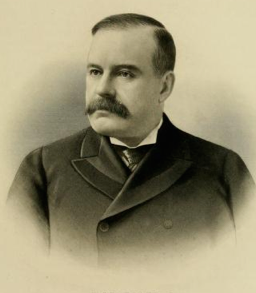Encyclopedia Dubuque
"Encyclopedia Dubuque is the online authority for all things Dubuque, written by the people who know the city best.”
Marshall Cohen—researcher and producer, CNN
Affiliated with the Local History Network of the State Historical Society of Iowa, and the Iowa Museum Association.
POWER, John W.
POWER, John W. (Dubuque, IA, Apr. 6, 1844--Fort Benton, MT, Feb. 10, 1901). Power was educated in the schools of Dubuque and a course at Sinsinawa Mound College, Wisconsin. He followed his brother Thomas Charles POWER to Montana arriving on June 11, 1867. He brought with him a supply of goods to trade with Native Americans and settlers. (1)
In 1871 he joined his brother in business. Their trade became very profitable with thirteen stores on the border with Canada and two on the Canadian side. By 1875 their trade with local tribes for buffalo robes reached 36,000 which they sold in New York and Chicago. When the buffalo herds declined, they continued a profitable trade with miners and stockmen in the area around Fort Benton. (2)
The firm of T. C. Power and Brother was eventually incorporated. The business was extended throughout Montana with John serving as vice-president. (3)
Much of the credit the brothers needed to finance their business ventures came from banks. In 1879 John W. Power was instrumental in founding the First National Bank of Fort Benton. In 1887 he played an important role in establishing the Stockmen's National Bank and remained its president until the time of his death. He was one of the organizers of the American National Bank of Helena in which his brother Thomas was president and they were both involved in the organization of the Bank of Fergus County at Bismarck, North Dakota. The brothers role' in establishing these banks ensured their positive treatment when loans were needed. (4)
The lack of a bridge across the Missouri River at Fort Benton had limited the development of the city for many years. John W. Palmer promoted the construction of a bridge, organized the company to build it, and purchased a great deal of its capital stock. The brothers operated nine steamboats on the Missouri above Fort Benton and were therefore interested in developing river traffic south of the community. John W. Power also held major interests in mining and stock-raising ventures in Montana. (5)
In 1890 Power was elected to the state senate.
---
Source:
1. Progressive Men of the State of Montana. Chicago: A. W. Bowen & Co. Online: https://openlibrary.org/books/OL14052559M/Progressive_men_of_the_state_of_Montana.
2. Ibid.
3. Ibid.
4. Klasen, Henry C. "Shaping the Growth of the Montana Economy: T. C. Power & Bro. and the Canadian Trade, 1869-93," Great Plains Quarterly, 1991 p. 6 Online: http://digitalcommons.unl.edu/cgi/viewcontent.cgi?article=1609&context=greatplainsquarterly
5. Progressive Men...


